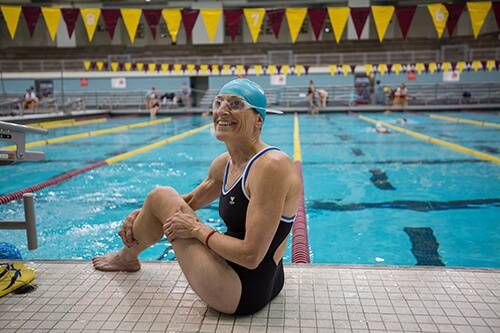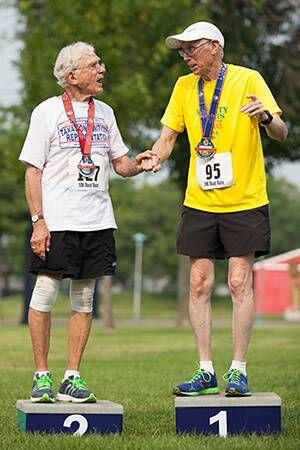What Keeps Older Athletes Going?
Participants at July's National Senior Games share their motivations
How can you be over the hill if you can still run up the hill?
That’s the lesson we all can learn from George Etzweiler.
Last month, Etzweiler, 95, became the oldest person to run up Mount Washington, the highest peak in the northeastern United States, in a daunting 7.6-mile uphill foot race called the Mount Washington Road Race.
Etzweiler also said the running “has kept me healthy, mentally and in every other way.”
There’s been some recent evidence to indicate that he might be right.
Senior Games Strength
A survey of more than 4,200 participants in the National Senior Games, the largest multi-sport event in the world for men and women 50 and older, showed that the senior athletes had cardiovascular fitness that effectively makes them younger than their chronological age.
The survey also found that the senior athletes had an average actual age of 68, but the exercise they were doing translated into a “fitness age” of only 43.

The National Senior Games, frequently called the Senior Olympics, is held every two years. This month, it’s taking place in Minneapolis-St. Paul, Minn., drawing nearly 10,000 athletes to compete in 26 sports ranging from swimming to shotput.
Why Quit Now?
For retired high school and middle school physical education teacher Joe Johnston, the games are a chance for him to compete in his favorite sport, pole vaulting.
Johnston, 71, of Apopka, Fla., learned how to pole vault as a teenager and never gave it up.
“My dad, when I was in my 40s and had a job and kids, he was like, ‘When are you going to quit doing that?’”
Johnston pole vaulted at the schools where he taught. After retiring, he built a jumping venue in a pole barn in his backyard. His grandkids call it the Joe Dome. Johnston calls himself “Jumpin’ Joe.” It’s part of his email address.
He even taught his wife, Janet, to pole vault. She’s 68 and also pole vaults at the National Senior Games, although she does not call herself “Jumpin’ Janet.”
Johnston said the fitness he’s maintained through pole vaulting is “my secret to a healthy lifestyle.”
Can’t Means Don’t
He said keeping active is what he preached to his students when he was a P.E. teacher and it’s the advice he gives his fellow older adults now.
“The reason you can’t do stuff? Do you know why? Because you don’t do it,” Johnston said. “The secret is to keep doing it. Keep on doing it.”
Johnston said he can’t jump nearly as high as he did in his prime, when he could come close to clearing 15 feet. But he keeps at it because pole vaulting is always “unfinished business.”
Pole vaulting always challenges you to do better, according to Johnston, because the competition ends in failure, after you’ve failed to clear the bar three times in a row.
“I’m ever in search for the best and most effective method for getting my butt over the bar,” Johnston said. “It’s you against the bar. It’s you against the sky.”
Motherhood and Marathons
Unfinished business is also what's kept Christine Kennedy, 60, running marathons for more than three decades.
In 1981, she was a housewife from Ireland with two young children when she saw that the women’s winner of that year’s Dublin Marathon was also a married woman with two kids.
Back in those days, “married women didn’t go out and run like the men,” Kennedy said.
But seeing that a marathon winner could be someone like her gave her permission to run.
“It took time for the neighbors to accept it,” she said. “I needed something more for me. I needed something for me outside of the family.”
Kennedy soon began winning marathons herself, including the Dublin Marathon. In 1991, she ran a marathon that was only five seconds short of qualifying for an automatic berth on an Olympic team. Kennedy said if she had gone to the Olympics, she probably would have retired from competition after her peak running years, as most elite runners do.
But not reaching that dream seems to have kept her competitive fire alive as a champion masters distance runner.
“I always wanted to set a goal and try to reach it,” she said. “I always liked competition and I like to be competitive.”
Kennedy now is a U.S. citizen and lives in the San Francisco Bay Area, where she co-owns two running stores.
Still Going Strong
Etzweiler, the mountain climber, is a retired Penn State electrical engineering professor who has made the trek up to the top of the 6,288-foot peak repeatedly. In last month’s version of the race, a couple of youngsters, Etzweiler’s 69-year-old son and 41-year-old grandson, joined him on the run.
Etzweiler said he didn’t take up running until later in life when he found that a sedentary lifestyle was resulting in weight gain.
“I didn’t run a full mile in my life until I was 49,” he said.

But soon he was competing as a masters athlete in cross country events and road races. Etzweiler regularly competes in a 50-mile relay race with a team of runners all over the age of 65 called “Old Men of the Mountain.”
“I look forward to it,” he said. “I think it’s the enjoyment of getting out with these guys.”
Kennedy says her goal this year is to be the first woman in the world to run a marathon in under three hours at the age of 60. She ran the Medtronic Twin Cities Marathon last fall in 2:59:39. She thinks she has another sub-three hour race in her this fall.
“I definitely feel I can achieve it,” she said. “I want other women to be inspired by that to set their goals and set them high.”

